Biden advisers in Jerusalem to discuss Saudi meetings
Advances in Israel-Saudi ties unlikely with this government and without engagement with Palestinians, source says.
By LAHAV HARKOV
Two of US President Joe Biden’s top advisers arrived in Israel to update Prime Minister Benjamin Netanyahu on the administration’s meetings in Saudi Arabia, amid talk in Jerusalem and Washington of normalization with Riyadh.
White House Coordinator for the Middle East and North Africa Brett McGurk and Special Presidential Coordinator for Global Infrastructure and Energy Security Amos Hochstein arrived in Israel from Jeddah, where they were part of a delegation led by US National Security Advisor Jake Sullivan on Saturday and Sunday.
They met with Netanyahu, who has said advancing relations with Saudi Arabia is a priority, and with National Security Adviser Tzachi Hanegbi and Strategic Affairs Minister Ron Dermer. In addition, they met with Foreign Minister Eli Cohen, who spoke by phone with US Secretary of State Antony Blinken later that day about “advancing additional normalization steps,” according to Cohen’s office.
A source with ties to the Saudi royal family said that “nothing will happen without Israeli-Palestinian engagement and with this Israeli government in particular.”
Is there progress on Israel-Saudi normalization?
The flight path McGurk and Hochstein took from Saudi Arabia to Israel may be an indication that not much has moved on the normalization front and they could not take a truly direct flight to Israel. Their plane took a detour, flying over the Mediterranean, before making a sharp turn towards Israel, as though they were flying to Cyprus and suddenly changed their mind.
Hanegbi said Israel is “very, very hopeful there will be a breakthrough” in Saudi-Israel normalization ahead of Sullivan’s visit.
“What is important is that the United States leads a move adding Saudi Arabia to the Abraham Accords – normalization and peace with Israel. If that happens, it will be a historic turning point,” Hanegbi told Channel 13.
“What is important is that the United States leads a move adding Saudi Arabia to the Abraham Accords – normalization and peace with Israel. If that happens, it will be a historic turning point.”Tzachi Hanegbi
One advance that Jerusalem hopes could take place is direct flights from Israel to Saudi Arabia for the annual Muslim pilgrimage to Mecca.
Sullivan said on Thursday that the Biden administration has “the interest and the bandwidth to promote normalization between Israel and Saudi Arabia... Getting to full normalization is a declared national security interest of the United States – we have been clear about that.”
Sullivan told the Washington Institute for Near East Policy on Thursday that “as a sign of my seriousness about how much we are focused on this and how seriously we are taking this, I’m not going to say anything further lest I upset the efforts we are undertaking on this issue.”
The US national security advisor met with his Saudi, Emirati and Indian counterparts in Jeddah to discuss a “shared vision of a secure and prosperous Middle East interconnected with India and the world.”
During his speech to the Washington Institute think tank, Sullivan highlighted a very similar forum, the I2U2, meant to promote cooperation between the same countries, but with Israel instead of Saudi Arabia.
“If you remember nothing else from my speech, remember I2U2, because you will be hearing more about it as we go forward,” Sullivan said.
The Indian Embassy in Israel did not comment as to whether Delhi is playing a role in encouraging Israel-Saudi Arabia normalization.
Source: https://www.jpost.com/israel-news/article-742410
Netanyahu Is the New MBS in the Israeli-Saudi-U.S. Triangle

A combination picture shows Saudi Arabia's Crown Prince Mohammed Bin Salman and Israeli Prime Minister Benjamin Netanyahu Credit: RONEN ZVULUN/ REUTERS
Saudi Arabia is the key to fulfilling President Biden’s strategy in the Middle East, but the kingdom is in a different place than it was a year and a half – and so is Israel
Zvi Bar'el
U.S. National Security Advisor Jake Sullivan’s visit to Saudi Arabia did not provide a lot of good news for Israel, which was not even one of the stops planned for his trip. True, Sullivan did hold a conference call with Prime minister Benjamin Netanyahu and National Security Adviser Tzachi Hanegbi before his flight to Riyadh, and two of his senior advisers – Brett McGurk and Amos Hochstein – did arrive in Israel on Monday to update their Israeli counterparts, but according to Israeli officials, no one is holding their breath in preparation for the signing of an agreement to normalize relations between Israel and Saudi Arabia.
“The normalization, if it does happen, does not stand on its own, it is part of a new fabric of strategic relations that President [Joe] Biden aspires to establish in the Middle East and which received urgency in light of the agreement to renew diplomatic relations between Saudi Arabia and Iran, and the growing involvement of China in diplomatic processes in the Middle East,” one Israeli official said.
The one-state reality in Israel-Palestine: what does it mean for U.S. policy?
This framework of relations even has its own captivating title: “Regional security architecture,” which will include security cooperation between the United States and countries in the region, including the Gulf states, Jordan, Iraq, Egypt and Israel – and between these countries too. This idea was also enshrined in the military budget for 2023, which was submitted in 2022 on Biden’s orders to his Secretary of Defense Lloyd Austin, who was tasked with formulating a detailed policy to map out the Iranian missile threats and to offer ways to address them.
A year earlier, the U.S. administration decided to add Israel to its Central Command, instead of its previous place in the European Command, a step that allows the U.S. military to conduct joint exercises with Israel and Arab nations, and to open channels of communication between the Israel Defense Forces and Arab militaries.
A civilian framework for regional cooperation called I2U2 Group was also established in 2021. The members, in addition to Israel, are the United Arab Emirates, United States and India. The purpose was to establish a framework for exchanging knowledge and investments in civilian sectors such as agriculture and energy – but also with a look toward security cooperation beyond military procurement and joint exercises.

U.S. President Joe Biden speaks as he attends the first virtual meeting of the "I2U2" group, in Jerusalem, in July, 2022.Credit: EVELYN HOCKSTEIN/ REUTERS
Senior officials in the Biden administration explained in interviews that the final goal of the “strategic architecture” is to strengthen the capabilities of the countries in the region to build defensive and warning systems that will not require American military involvement, and this will enable the withdrawal of American troops from all the countries and bases where they are deployed today. This does not mean the United States will not intervene in the case of a cardinal regional conflict, but it does mean empowering local capabilities to reduce the potential outbreak of large conflicts.
The integration of Israeli forces with those of Arab countries, and especially those of the Gulf states, is essential to fulfil this strategy. But this is where the United States ran into two main difficulties: In spite of the closer relations between Israel and Saudi Arabia, they have not signed a peace treaty, and even more importantly, Saudi Arabia is nurturing its cooperation with China, which in turn produced the agreement between the Saudis and Iran in March, under Chinese auspices.
At the same time, India – another important partner in the American strategy in region – is not committed exclusively to military cooperation with the Arab countries, and its relations with Iran and Russia make it very clear that for now, India prefers to keep all its options open. About a week before Sullivan’s visit to Riyadh – during which he met with the Emirates national security adviser Sheikh Tahnoon bin Zayed Al Nahyan and his Indian counterpart Ajit Doval – Doval visited Tehran. He met there with his Iranian counterpart Ali Shamkhani, President Ebrahim Raisi and Foreign Minister Hossein Amirabdollahian to discuss the expansion of economic cooperation between the two nations, and the trade between them has now reached $2.5 billion.
Iran asked India to put into operation a trade system based on the Iranian rial and Indian rupee to bypass the American sanctions on deals conducted in dollars, and it seems India plans on agreeing to the request. In addition, India and Iran have a shared interest in turning the Iranian port of Chabahar, the development of which India has invested in, into a commercial hub joining western Asia and China. This relationship between India and Iran, along with the expanding Chinese influence, has made India an nation essential for the United States in its attempts to construct a wall to block Iran and China.
Given the Biden administration’s assessment that the existing arrangement of regional relations – such as those between India and Iran, between Saudi Arabia, India and Pakistan, and recently between Saudi Arabia and Iran – are part of the new reality in the Middle East, the American goal is to at least preserve its power and status as an influential superpower. This would be carried out by the establishment of parallel strategic partnerships such as military and civilian cooperation between some of the countries in the region and would also include Israel. Washington cannot expect exclusivity anymore when the line between the pro-American and anti-American countries is becoming much fuzzier.
The country that’s the key to achieving the new architecture is Saudi Arabia. But the Saudis now have a different status than a year and a half ago – and the same goes for Israel. From a nation ostracized by the United States, Saudi Arabia has now become a sought-after country that has forced Biden to visit and meet with a man who repulses him, Crown Prince Mohammed bin Salman, and to ask him to raise oil production quotas in an attempt to reduce the energy shortage resulting from the Russian invasion of Ukraine.

U.S. President Joe Biden and Saudi Crown Prince Mohammed bin Salman meeting in Jeddah in July.Credit: Bandar Algaloud/Saudi Royal Court/Reuters
The crown prince may have bumped fists with Biden, but no oil came out of it. The tension between the two leaders remained, and even grew. Saudi Arabia still hopes to rebuild its relations with the United States, but this time the country’s new status may also allow it to dictate conditions – and not just obey them. Riyadh also realized quite well that the previous Israel, which could influence the U.S. government to grant it rehabilitation, no longer exists. Crown Prince Mohammed is certainly finding it hard to be convinced that the Israeli prime minister, who has not yet been invited to White House for a visit, is actually the person who could build a friendly relationship between him and Biden. In practice, Netanyahu has now found himself in the place where Crown Price Mohammed was with the Biden administration, just without the levers of influence the Saudi leader has.
Given all this, it now seems the price of normalization between Israel and Saudi Arabia will have to be adjusted to take into account America’s interests and what it is willing to pay the Saudis in return, beginning with the approval for construction of American-built nuclear reactors, the sale of advanced warplanes – and no less important, reliance on Crown Prince Mohammed as the “trustee” for American policy in the region, as he was during Donald Trump’s presidency, and that of his predecessors. Saudi Arabia is not in hurry. It isn’t the one under pressure and it’s not the one worried about losing its influence in the region.
Source: https://www.haaretz.com/middle-east-news/2023-05-09/ty-article/.premium/netanyahu-is-the-new-mbs-in-the-israeli-saudi-u-s-triangle/00000187-fd00-d78f-a5d7-fd4354be0000
After talks in Saudi Arabia, senior White House officials to meet PM in Jerusalem
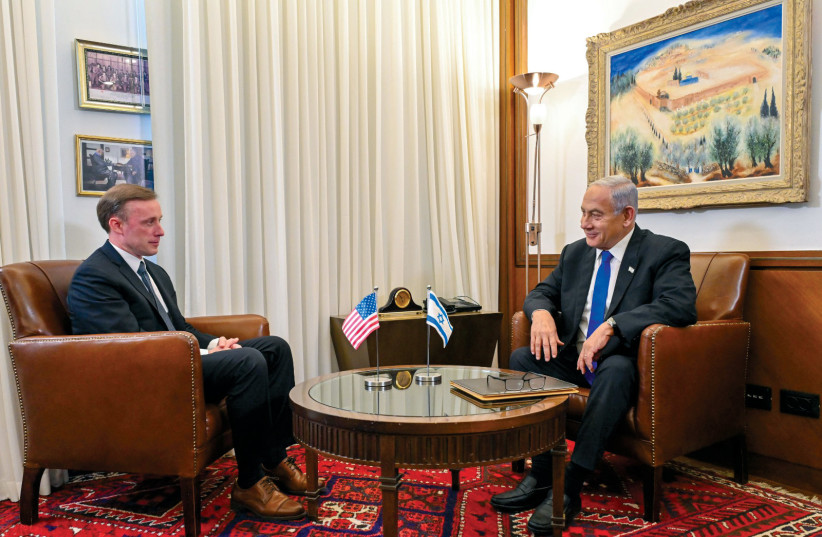
By LAZAR BERMAN
After US National Security Adviser Jake Sullivan’s meetings on Sunday with the Saudi crown prince in Saudi Arabia, senior US officials who participated in the meetings flew to Jerusalem to brief Prime Minister Benjamin Netanyahu.
US Middle East envoy Brett McGurk and energy czar Amos Hochstein flew from Jeddah to meet with Netanyahu, Strategic Affairs Minister Ron Dermer and National Security Adviser Tzachi Hanegbi, the Walla news site reported.
Sullivan spoke with Crown Prince Mohammed Bin Salman about normalization with Israel, according to reports, and the White House officials will update Netanyahu about the conversations.
Netanyahu has pledged to establish diplomatic ties with the Saudis, even saying that he could get it done within the year.
While Saudi officials have privately expressed interest in such an agreement in recent years, the prospects of Israeli-Saudi normalization remain unclear.
Riyadh has presented extensive demands to the United States regarding major improvements to their bilateral relationship as a prerequisite for a deal. The hardline nature of Prime Minister Benjamin Netanyahu’s government, which has already garnered several blistering condemnations from the Gulf kingdom over its policies toward the Palestinians, has made normalization less palatable to both the palace and the street.
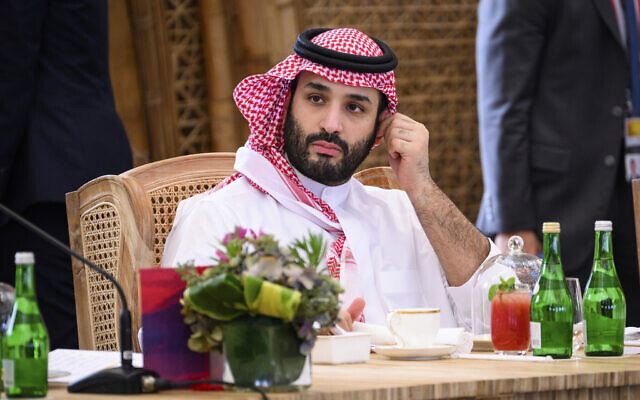
File: Crown Prince Mohammed bin Salman of Saudi Arabia takes his seat ahead of a working lunch at the G20 Summit, Nov. 15, 2022, in Nusa Dua, Bali, Indonesia (Leon Neal/Pool Photo via AP, File)
Last Thursday, Sullivan said at a Washington, DC, conference that the US sees a benefit to its national security in brokering a normalization agreement between Israel and Saudi Arabia, underlining the Biden administration’s commitment to continue focusing on expanding the Abraham Accords in the coming period.
Foreign Minister Eli Cohen is also scheduled to speak with senior US officials on Monday before heading to India. He will meet in Jerusalem with Hochstein, according to Cohen’s office.
Hochstein was instrumental in bringing about the 2022 maritime deal with Lebanon.
Cohen will speak with US Secretary of State Antony Blinken by phone later in the day. He is slated to take off for India at 10:45 p.m., where he will meet with Prime Minister Narendra Modi and Foreign Minister Subrahmanyam Jaishankar.
The conversations come amid a diplomatic push by the US in the wake of regional achievements by Iran and Washington’s global rival China.
In March, Saudi Arabia and Iran agreed to restore ties after seven years of estrangement. The deal was finalized in Beijing, underscoring the perception of weakened US influence in the Middle East.

US Senior Advisor for Energy Security Amos Hochstein arrives at at meeting in Beirut on July 31, 2022. (Anwar AMRO / AFP)
On Sunday, in another diplomatic win for the pro-Iran axis, Arab government representatives in Cairo voted to return Syria to the Arab League after a 12-year suspension.
China has been moving aggressively into the region, investing heavily in a series of roads, rails and seaports as part of its Belt and Road Initiative, which is designed to capture a greater share of trade flows from the Middle East, Africa, Central Asia and Europe.
But the Biden administration seems to be at start of a diplomatic counteroffensive. In Saudi Arabia on Sunday, Sullivan also met with his Saudi, Emirati, and Indian counterparts, discussing a rail and port network linking the Gulf states and India.
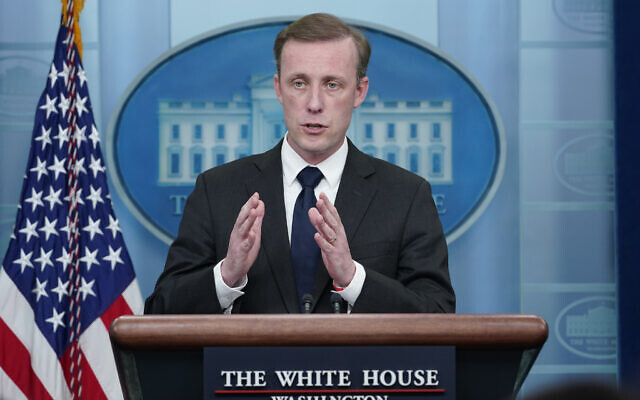
White House national security adviser Jake Sullivan speaks during the daily briefing at the White House in Washington, December 12, 2022. (Susan Walsh/AP)
The idea reportedly arose during meetings of the I2U2 forum, which includes Israel, India, the US, and UAE, though Israel was not part of Sunday’s discussion.
The Foreign Ministry would not comment on the agenda for Cohen’s talks with Blinken.
Cohen and Blinken spoke in late March, looking to patch up ties after a rare public spat between US President Joe Biden and Prime Minister Benjamin Netanyahu over the Israeli government’s efforts to drastically weaken the judiciary.
In the call, Blinken “reaffirmed the importance of the enduring US– Israel bilateral relationship,” State Department spokesman Vedant Patel said.
Blinken also discussed Iran, seen by Israel as a paramount threat, and renewed US support for a Palestinian state — an idea rejected by much of Netanyahu’s government.
In his statement, Cohen said the two discussed expanding relations with Arab states as part of the Abraham Accords, Israel’s efforts to qualify for the US visa waiver program, and the judicial overhaul legislation.
“Relations with the US is one of the pillars of our foreign policy. We will work in every way to strengthen the dialogue with our great friend, and I am happy that there is an open channel for conversation between me and the secretary of state,” Cohen tweeted.
They also spoke in January shortly after Cohen took office. Blinken asked Cohen to convey messages on to Russia, a senior diplomatic official told The Times of Israel.
And the pair met in person during Blinken’s Israel trip later that month.
Source: https://www.timesofisrael.com/amid-us-diplomatic-push-fm-cohen-to-speak-with-senior-white-house-officials/
US delegation in Israel after Saudi visit, discussing regional projects with Netanyahu
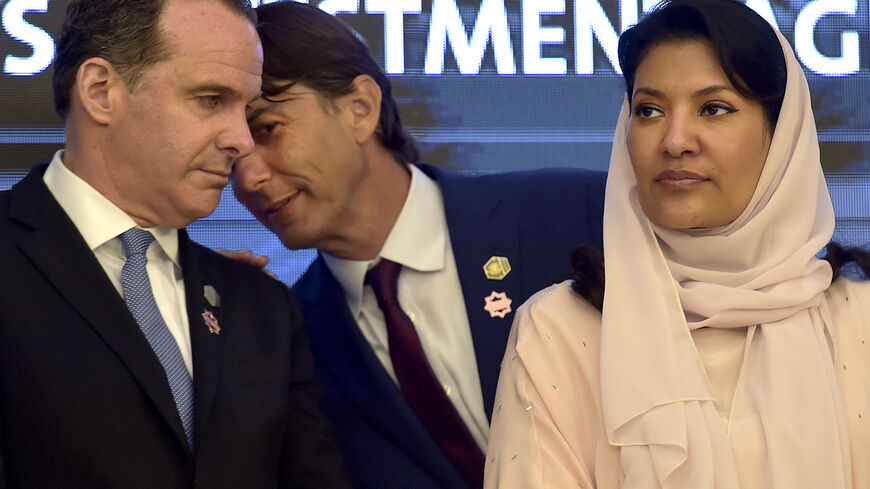
Brett McGurk, US National Security Council coordinator for the Middle East and North Africa, listens to Amos Hochstein, the US Senior Advisor for Energy Security, as Princess Reema bint Bandar bin Sultan bin Abdulaziz al-Saud, Saudi ambassador to the US, looks on during an investment agreement signing ceremony between the US and Saudi Arabia in the Red Sea coastal city of Jeddah on July 16, 2022. - AMER HILABI/AFP via Getty Images
Advancing the I2U2 initiative, Prime Minister Benjamin Netanyahu was set to meet in Jerusalem with envoys of the Biden administration, following their trip to Saudi Arabia where they held extensive talks on infrastructure projects that involve India, Gulf countries and Israel.
Rina Bassist
In a bid to advance normalization with Saudi Arabia, Israel’s Prime Minister Benjamin Netanyahu was scheduled to meet on Monday in Jerusalem with US National Security Council coordinator for the Middle East and North Africa Brett McGurk and US special envoy on energy Amos Hochstein, who had both accompanied US national security adviser Jake Sullivan on his visit to Riyadh this weekend.
Israeli Foreign Minister Eli Cohen met on Monday in Jerusalem with Hochstein to discuss the advancement of diplomatic moves in the region. A statement issued by Israel’s Foreign Ministry Monday evening said that after meeting with Hochstein, Cohen spoke on the phone with Secretary of State Anthony Blinken and updated him on Israel’s diplomatic activities in recent weeks to advance regional stability. The statement said that Cohen and Blinken discussed advancing more normalization moves in the framework of expanding and deepening the Abraham Accords (normalizing relations between Israel and the Arab world) and in the framework of the Negev forum.
Sullivan met on Sunday with Saudi Prime Minister and Crown Prince Mohammed bin Salman, Emirati national security adviser Tahnoon bin Zayed Al Nahyan and Indian national security adviser Ajit Doval. A readout issued by the White House said the purpose of the quadruplet meeting was to "advance their shared vision of a more secure and prosperous Middle East region interconnected with India and the world."
According to an Al-Monitor report published before the meeting, participants were slated to discuss a possible major joint infrastructure project that would connect Gulf and Arab countries via a network of railways. This network of railways would connect also to India via shipping lanes from ports in the region. Israel wants to be part of this interconnection project.
The idea for the quadruplet initiative came up at a meeting of the so-called I2U2 forum, a partnership focused on economic development and food security amid global climate change. The I2U2 forum includes Israel, India, the United States and the United Arab Emirates. First initiated in July 2021 by then-Foreign Minister Yair Lapid, the forum has since brought together leaders from the four countries via Zoom in 2022 and via several meetings of other senior officials. A meeting in Washington last April of senior officials from Israel, India, the United States and the UAE, reported on by Al-Monitor, saw the signing of a memorandum of understanding to create a joint business coalition to promote the I2U2 initiative.
According to Haaretz, Netanyahu's meeting with the two American envoys is part of a recent push by the Biden administration for normalization between Israel and Saudi Arabia. Washington believes that despite its rapprochement with Tehran, Riyadh could also advance on normalization, the same as the Emirates — which maintains diplomatic ties with both Israel and Saudi Arabia. Strengthening India is also an important interest of the Biden administration, faced with the expanding regional influence of China.
Addressing the Washington Institute for Near East Policy last Thursday, Sullivan said that brokering normalization between Israel and Saudi Arabia is also an important American interest and that such moves underline the commitment of the Biden administration to continue focusing on expanding the Abraham Accords.
“We have the interest and bandwidth to promote normalization between Israel and Saudi Arabia, and in fact, it’s this administration that has produced the first tangible step of these two countries coming close together with the opening of the airspace over Saudi Arabia for civilian flights from Israel,” said Sullivan, adding that “ultimately, getting to full normalization is a declared national security interest of the United States; we have been clear about that.”
Sullivan further said that the Biden administration is committed to “supporting Israel’s ultimate, final, complete integration into the Middle East region and the world,” and that “this will be an area of continuing emphasis and focus for us over the coming period as we look to add more countries and to bring Israel even more deeply into the web of relationships in the Middle East and beyond.”
Source: https://www.al-monitor.com/originals/2023/05/us-delegation-israel-after-saudi-visit-discussing-regional-projects-netanyahu

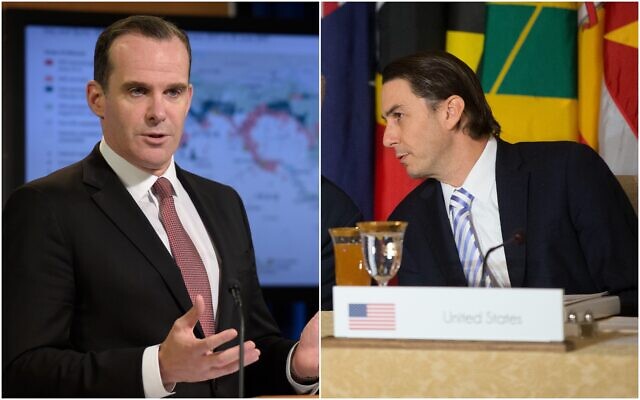
.png)
